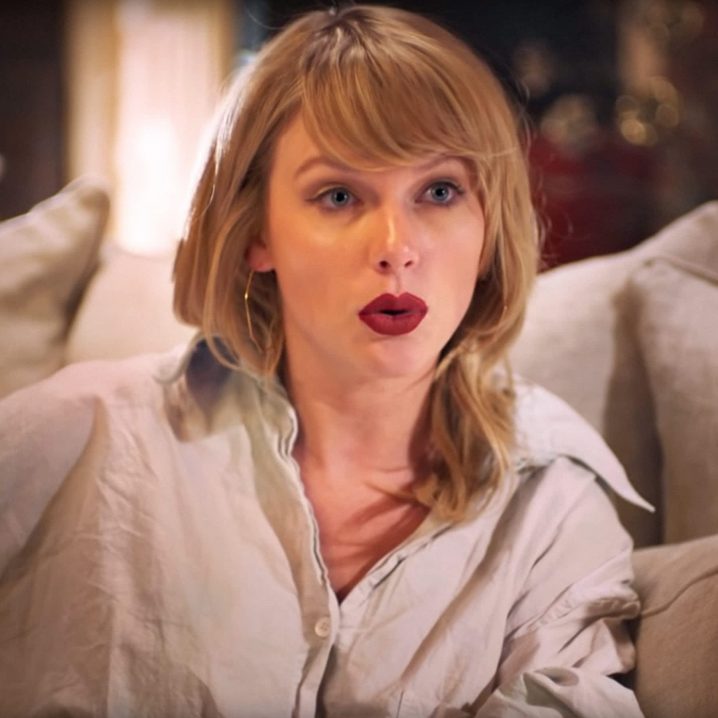
- POPSUGAR Australia
- Celebrity
- Why Taylor Swift's Comment About Age in Miss Americana Worries Me
Why Taylor Swift's Comment About Age in Miss Americana Worries Me

While by no means a tell-all, Miss Americana, Taylor Swift’s new Netflix documentary, opens up on topics the musician has long kept private, from her relationship with Joe Alwyn to her eating disorder. It’s a political project as well, showcasing her growing commitment to speaking out against injustice. But as a long-time Swiftie who’s excited about her political awakening, one moment in the documentary worried me: Taylor’s confession about her aging stardom, particularly her acceptance that she probably doesn’t have much time left as an artist. She seemingly nails down this message with “Only the Young,” her new anthem about the power of the youth to enact change – to “run.”
“Women in entertainment are discarded in an elephant graveyard by the time they’re 35.”
“We do exist in this society where women in entertainment are discarded in an elephant graveyard by the time they’re 35,” Taylor candidly narrated. She explained how young female artists must constantly reinvent themselves to keep working. “As I’m reaching 30, I’m like, I want to work really hard while society is still tolerating me being successful,” she concluded.
While Taylor isn’t my role model per se, I certainly identified her music over the years as I grew up. The soundtracks to my AP exam study sessions were Speak Now and Fearless. Red got me through my first real heartbreak in college. Not long ago, 1989 and Reputation shepherded me through the murky waters of post-grad life. Now, I pop on my fancy deluxe version of Lover once at least once a week as I work on articles like this. When Taylor talked about this moment being her last shot in the industry, it felt disappointing, especially as she’s just finding her voice as a feminist.
I’m 25, younger than her, but still old enough to feel the pressure of getting my sh*t together before I socially expire at age 35. It’s supposedly the era of my life by which I must be committed to a family, a skincare regimen, and, if I’m lucky, a career that’s respectable, but not intimidating. I’m certain this anxiety must be something many women feel, not just those in entertainment.
Taylor’s discussion of that elephant graveyard reminds me of Jia Tolentino’s essay “Pure Heroines,” which considers the role of female protagonists in literature. Young girls, like Anne Shirley and Harriet the Spy, start out bright and plucky. Older female protagonists become bitter and depressed, often eventually dying like the titular character in Anna Karenina and Edna Pontellier in The Awakening. Ultimately, our cultural heroines are portrayed as such because we haven’t made enough room for women in the real world.
It doesn’t have to be this way, though. Taylor can exclude herself from this narrative and pave a path for other women. For her fans who grew from little girls to adult women. With 126 million Instagram followers and a $400 million net worth, she can do whatever she wants and stand up for issues in meaningful ways. At 36, Beyoncé headlined Coachella with performances that celebrated historically black colleges. Respectively at 43 and 50, Shakira and Jennifer Lopez lit up the Super Bowl halftime show, in which they powerfully alluded to the child migration crisis. Heck, at 82, Jane Fonda has a popular Netflix show and regularly speaks out against climate change.
Taylor is by no means apolitical, of course. In Miss Americana, she nervously sent out an Instagram post announcing her support for the Democratic candidate Phil Bredesen, who ran against the Republican representative Marsha Blackburn for a spot as Tennessee senator. Still, was this the riskiest thing Taylor could have done after fifteen years of political silence? While it brought out voters, it was just a post, far from the equivalent of organizing a rally or collaborating with a community on-the-ground. We routinely see woke teenagers on TikTok discuss politics, after all.
While I don’t doubt that Taylor’s intentions, criticisms of her capitalizing on feminism are legitimate. Naturally, they will come as she’s still green to the field of politics. Empowerment songs like “The Man” (a banger, still) can come off as vaguely inspiring as they center around her. Sure, we need women leaders. But are they just fending for themselves or also for the vulnerable? Taylor seldom talks about her privileges as a wealthy white woman in the music industry, often coyly alluding to her white conservative fan base as her “country roots.” Privilege isn’t inherently a bad thing – it’s how Billy Ray Cyrus helped Lil Nas X, a young queer Black artist, dominate the charts.
While the entertainment industry might deem her old, it feels like Taylor is just on the cusp of coming of age politically. But she has time to change and grow. The AMAs recently deemed her the artist of the decade. And she can continue to be a remarkable artist and ally beyond the 2010s, should she resist society shoving her into the elephant graveyard.
One of my favorite hits from Lover is “The Archer,” in which she sings, “I never grew up, it’s getting so old / Help me hold onto you.” To me, it’s a song about getting older and the difficult, but valuable insights that come with it. Hopefully, Taylor holds onto that message.

